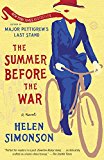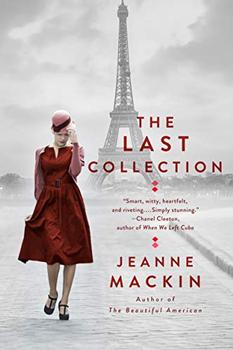Summary | Excerpt | Reading Guide | Reviews | Beyond the book | Read-Alikes | Genres & Themes | Author Bio

Set on the cusp of World War I, The Summer Before the War exudes strength and spirit as a small town attempts to assimilate its age-old rules of class and etiquette with the realities of a country going to war. Twenty-three-year-old "spinster" Beatrice Nash makes her way to Rye (see 'Beyond the Book') where she intends to teach Latin at the local school. Armed with mere fortitude and wit, Ms. Nash hopes to eke out a living while maintaining her integrity and independence: "... I crave only to be allowed my work, and my rest, away from the stupidities of society."
But in 1914, when the book is set, the limitations on women significantly outweigh the recognition of their capabilities. Rye is governed by long-standing rules of convention that serve to preserve the social order. Beatrice soon learns that maintaining the uprightness of things is busy business, and is disturbed to find herself the subject of much inquiry and speculation. Fortunately, Beatrice has an ally — the far older Agatha Kent, who is well versed in the art of Rye's small-town politics. Agatha is Beatrice's primary supporter both socially and emotionally and offers insight and guidance as the newcomer adapts to her surroundings.
Simonson's characters are provided with rich opportunities to scuttle about, sip tea, mind the affairs of others, and fuel the endless flow of gossip. As the murmurs of war deepen so does the vigor of patriotism. A flurry of committees and festivities becomes fodder for the rising conflict. The women of the town compete to organize and overdo their fetes in celebration of the soldiers, providing comic relief as the pageantry is pushed to new and obscene heights.
While Simonson's small-town whimsy permeates the novel, the story does not undermine its more weighty subject. When the military titles and airs that have so arrogantly been worn by the men of Rye actually give way to the defense roles to which they were assigned, the reality of going to war truly sets in. "It is a bad dream, is it not? We are all so caught up in the work of it and the excitement and the urge to do important things, and we have not stopped to see the true nature of it."
The story is seen through a tight cast of colorful characters who offer unique takes on this time in history. Beatrice, Aunt Agatha and her nephews Hugh and Daniel, share insights from the perspectives of age, profession, art, race, and gender. Using these, Simonson crafts individual plot lines that stress social prejudice and its uselessness in the face of war.
As the men of Rye head off to serve their country, there is a deepening void when the reality of their dismal situation sinks in. Simonson's prose is sharp and accessible, drawing analogies from the fabric of Rye's landscape. For example, a somber Agatha finds a dying bee in her beloved garden, likening it to soldiers' deaths: "She had been bold and compassionate enough to scoop it up on a big blue, quilted hosta leaf and carry it to the lawn, but the bee continued to struggle and buzz in the grass, like an angrily pressed doorbell, until its tiny threadlike legs crumpled and it died. Later the gardener told her that the hive had collapsed, all the bees dead inside their combs..."
The Summer Before the War will appeal to lovers of historical fiction, and, like Major Pettigrew's Last Stand, dazzle book clubs. The town of Rye and its coastal surroundings are sure to pique curiosity and entertain those with an interest in history. Simonson's latest work is a treasure and serves as a social commentary of the times leaving much room for discussion on issues of race, gender bias, sexuality, and politics.
![]() This review was originally published in The BookBrowse Review in April 2016, and has been updated for the
February 2017 edition.
Click here to go to this issue.
This review was originally published in The BookBrowse Review in April 2016, and has been updated for the
February 2017 edition.
Click here to go to this issue.

If you liked The Summer Before the War, try these:

by Jeanne Mackin
Published 2020
An American woman becomes entangled in the intense rivalry between iconic fashion designers Coco Chanel and Elsa Schiaparelli in this vivid novel from the acclaimed author of The Beautiful American.

Grendel's Guide to Love and War
by A. E. Kaplan
Published 2017
The Perks of Being a Wallflower meets Revenge of the Nerds in this tale of a teen misfit who seeks to take down the bro next door, but ends up falling for his enemy's sister and uncovering difficult truths about his family in the process.
Your guide toexceptional books
BookBrowse seeks out and recommends the best in contemporary fiction and nonfiction—books that not only engage and entertain but also deepen our understanding of ourselves and the world around us.